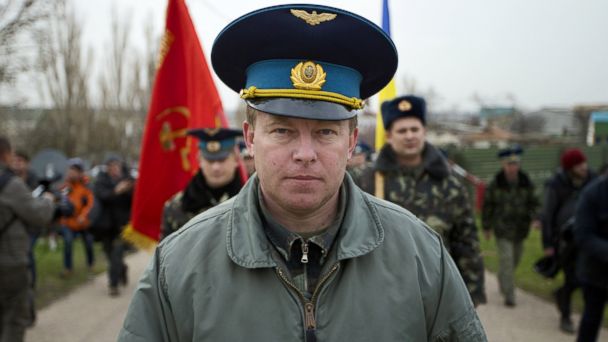As Russia Takes Over, Base in Crimea Is a Lonely Island

Col. Yuli Mamchur, commander of the Ukrainian garrison at the Belbek air base, lead his men to the base outside Sevastopol, Ukraine, March 4, 2014. Ivan Sekretarev/AP Photo
BELBEK, Crimea - Colonel Yuli Mamchur is a rare breed in Crimea these days: a Ukrainian base commander who is still in charge of his base. As Russia completes its takeover of the peninsula, the Ukrainian bases that haven't yet been seized by Russia are the last remnants of Ukrainian control in Crimea and their numbers are dwindling by the day.
On Wednesday, Mamchur watched as the nearby headquarters of Ukraine's navy was overrun by an angry pro-Russia mob that allowed Russian soldiers to quickly take control and force Ukrainian officers and sailors off the base. In the process, Ukraine's navy commander was detained by pro-Russia Crimeans, driven away in a green Volkswagen. He was released this morning.
Mamchur has become known as the man who stood up to the Russians. On March 4 he marched some 300 troops up a hill to the Belbek base's airfield - one of the first facilities to fall to the Russians when they invaded - to demand that his forces be allowed to resume their normal activities.
The Russian forces fired warning shots and a tense four-hour standoff and negotiation ensued, which ended when Mamchur marched his men back down the hill to the base.
Today there was little sign of any tension on or around Mamchur's base in Belbek, home of 204th Tactical Aviation Brigade, on the edge of the port city of Sevastopol. Other than a large olive green truck parked in front of the gate to ward off a storming, there was nothing to indicate that this base could be the next to fall. There were no Russian or pro-Russian forces stationed ominously outside the gate, Ukrainian troops carelessly walked around inside, unarmed.
Wearing a brown leather jacket and fatigues, Mamchur spoke in clipped, quiet sentences, attempting to project an air of optimism but unable to mask how deflated he is.
"It's not pleasant," he admits while standing just inside the entrance of the base, a few feet from a small contingent of armed airmen acting as bodyguards.
"Within 48 hours, a solution will be found," he says hopefully, explaining that the Russian and Ukrainian defense ministries are trying to work out a peaceful resolution that would spare his base the violent end the naval headquarters saw.
"We have a deal," he says of the local pro-Russian militias. "We won't touch them, they won't touch us. We won't get on each other's nerves."
Before the referendum that saw Crimeans vote overwhelmingly to join Russia, Mamchur says he received a call from an unidentified Russian general offering him an apartment if he surrendered his base.
"I told him to stop bullsh-ing," Mamchur told ABC News. "We cannot be bought."
He deflects most questions about his own feelings on the inevitable surrender of his base, saying it's up to the politicians now and that he's simply a soldier following orders. But Mamchur is from central Ukraine and says Crimea should stay in Ukraine.
"We let it go up in smoke," he says.
The brigade will get reassigned to another part of Ukraine now, Mamchur says, but some of the troops who are Crimeans will stay here with their families. It's unclear what the surrender will look like, whether the Ukrainians will be allowed to drive out in a convoy with their weapons. The Ukrainian government announced Wednesday that it has begun working out a plan to re-settle as many of the 25,000 troops and their families as possible.
For all of Mamchur's stoicism, his wife Larissa - standing in front of their dormitory just outside the base's gates - was much more emotional about the prospect of suddenly uprooting and moving back to mainland Ukraine.
"We wanted to retire here," she said. "We fell in love with this place and wanted to spend the rest of our lives here."